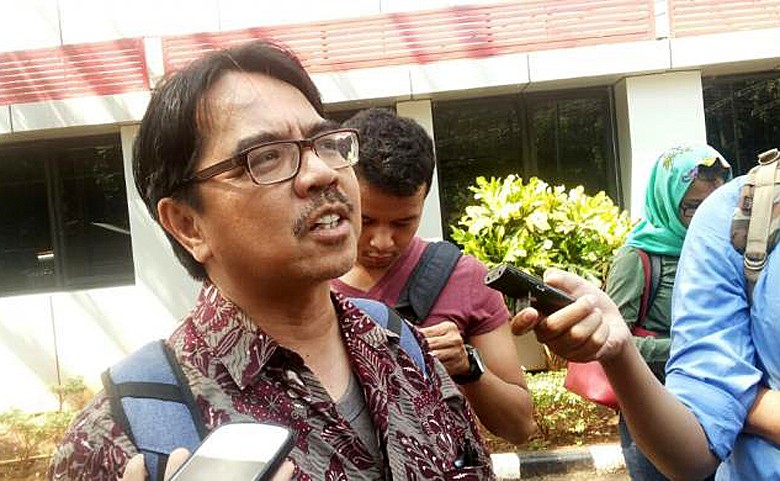Popular Reads
Top Results
Can't find what you're looking for?
View all search resultsPopular Reads
Top Results
Can't find what you're looking for?
View all search resultsPSI’s Ade Armando aims for upset win in legislative race
Former University of Indonesia lecturer Ade Armando praised the Indonesian Solidarity Party (PSI) for its egalitarian tradition, which has allowed him and other figures to join the party’s attempt to disrupt the political landscape.
Change text size
Gift Premium Articles
to Anyone
 University of Indonesia lecturer Ade Armando speaks to journalists after questioning by the Jakarta Police, in this file photo taken in 2016. Ade, who left his lecturing job to become a politician with the Indonesian Solidarity Party (PSI), vows to uncover the ugly truth of legislators from within the House of Representatives. (Kompas.com/ Akhdi Martin Pratama)
University of Indonesia lecturer Ade Armando speaks to journalists after questioning by the Jakarta Police, in this file photo taken in 2016. Ade, who left his lecturing job to become a politician with the Indonesian Solidarity Party (PSI), vows to uncover the ugly truth of legislators from within the House of Representatives. (Kompas.com/ Akhdi Martin Pratama)

A recent hire of the Indonesian Solidarity Party (PSI) has defended the youth-focused political party’s efforts to go against the norm of entrenched elite politics, amid criticism over its recruitment of more senior public figures.
Firebrand University of Indonesia lecturer-turned-politician Ade Armando praised the PSI for its democratic and egalitarian tradition, which has allowed him and other figures to join the party’s attempt to disrupt the landscape.
“Don’t picture [...] PSI like the other parties, which are very hierarchical and top-down. If I can use my own term for it, the party is an NGO that was turned into a political party,” Ade said in an interview with kompas.com.
“Its behavior, actually, that of the people, is the behavior of NGOs,” he added.
Ade is just one from a list of senior public figures that have joined the PSI, which bills itself as a party for millennials. With a strong social media presence, the party is preparing to run in the upcoming legislative election, after having failed to pass the electoral threshold required to obtain House of Representatives seats in 2019.
The party announced last month several new additions to the party roster, including senior TV presenter Helmy Yahya and social justice activist Irma Hutabarat. Instead of praise, the move drew criticism for what some considered to be a loss of identity in search for electability.

For Ade, a divisive voice on social media, the PSI has been consistently fighting for issues that have had a detrimental impact on society at large.
As a newcomer in politics, he claimed the party would keep its pledges to bring about reform in the legislature by exposing the ugly truth about sitting politicians.
Read also: PSI to continue backing Ganjar despite slide in polls“The PSI [wants to] make an entrance, enact reforms, make noise and report back to the public about what we see happening at the House, whether someone falls asleep [during hearings], is absent or does not work, or if people are paying to pass certain laws,” Ade said on Thursday.
“Slowly, I suspect this will bring about some impact, so that other parties will feel they have to be transparent to survive.”
Many political parties, including the PSI, have resorted to recruiting well-known and outspoken public figures to help them grow their following and convert votes at the ballot.
However, an ongoing review of the legislative election system at the Constitutional Court could prove detrimental to parties reliant on star power to canvass votes, should the court justices’ rule to reverse current practices.
The petition to review the open-listed election system, which allows voters to directly elect individual candidates for the legislature, was put forward by six plaintiffs, including a member of the ruling Indonesian Democratic Party of Struggle (PDI-P), a close ally of the PSI.
The PDI-P has backed a return to the closed-list system, whereby voters elect a party that in turn would name its preferred candidate to become a legislator, effectively forcing parties to offer more compelling ways to win votes.








